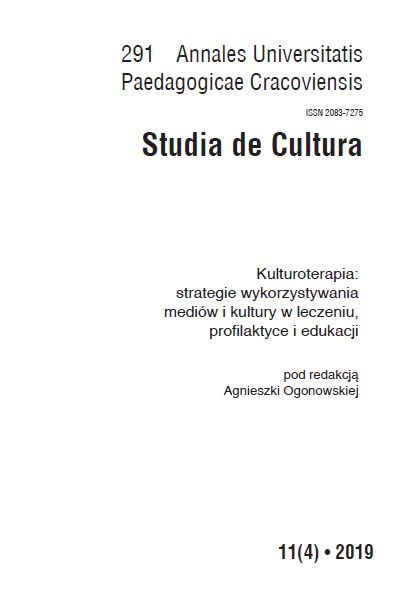Abstract
This article is an attempt to analyse the so-called culture of therapy in the context of two completely separate sciences - sociology of culture and neurobiology. The author’s deliberations on this subject are preceded by an introduction concerning the problems resulting from combining separate scientific paradigms, in particular the problem of reductionism and emergence of social phenomena. Further, the author puts forward a thesis that the culture of therapy is the result of anomie, whose direct cause is the lack of cultural homeostasis. The most visible indicator of this is the difficulty individuals have in constructing their identity. The culture of therapy seems to be an attempt to find an antidote to this state of affairs. The article concludes with a reflection on the competences necessary to construct a relatively coherent identity in the contemporary world.
References
Causadias Jose, Telzer Eva H., Gonzales Nancy A. 2018. Introduction to Culture and Biology Interplay. W: The Handbook of Culture and Biology. Jose M. Causadias, Eva H. Telzer, Nancy A. Gonzales (red.). Hoboken. 1–29.
View in Google Scholar
Czabała Jan. 2016. „Poradnictwo psychologiczne a psychoterapia”. Roczniki psychologiczne nr 3. 519–533.
View in Google Scholar
Casey Marie. 2002. „Authority. Crisis and the Individual”. Society nr 39(2). 78–82.
View in Google Scholar
Cloud Diana. 1998. Control and Consolation in American Culture and Politics. Rhetoric of Therapy. Thousand Oaks.
View in Google Scholar
Darwin Karol. 1998. O wyrazie uczuć u człowieka i zwierząt. Zofia Majlert, Krystyna Zaćwilichowska (przeł.). Warszawa.
View in Google Scholar
Durkheim Émile. 2011. Samobójstwo. Studium z socjologii. Krzysztof Wakar (przeł.). Warszawa.
View in Google Scholar
Damasio Antonio. 2000. Tajemnica świadomości. Ciało i emocje współtworzą świadomość. Maciej Karpiński (przeł.). Poznań.
View in Google Scholar
Damasio Antonio. 2002. Błąd Kartezjusza. Emocje, rozum i ludzki mózg. Maciej Karpiński (przeł.). Poznań.
View in Google Scholar
Damasio Antonio. 2005. W poszukiwaniu Spinozy. Radość, smutek i czujący mózg. Janusz Szczepański (przeł.). Poznań.
View in Google Scholar
Damasio Antonio. 2011. Jak umysł zyskał jaźń. Konstruowanie świadomego mózgu. Norbert Radomski (przeł.). Poznań.
View in Google Scholar
Damasio Antonio. 2018. Dziwny porządek rzeczy. Życie, uczucie i tworzenie kultury. Andrzej Jankowski (przeł.). Poznań.
View in Google Scholar
Donzelot Jacques. 1979. The Policing of Families. New York.
View in Google Scholar
Elliott Anthony, Lemert Charles. 2006. The New Individualism: The Emotional Costs of Globalization. New York.
View in Google Scholar
Foucault Michael. 1977. Archeologia wiedzy. Andrzej Siemek (przeł.). Warszawa.
View in Google Scholar
Foucault Michael. 1987. Historia szaleństwa w dobie klasycyzmu. Helena Kęszycka (przeł.). Warszawa.
View in Google Scholar
Foucault Michael. 2002. Porządek dyskursu. Michał Kozłowski (przeł.). Gdańsk.
View in Google Scholar
Foucault Michael. 2009. Nadzorować i karać. Narodziny więzienia. Tadeusz Komendant (przeł.). Warszawa.
View in Google Scholar
Furedi Frank. 2003. Therapy Culture. Cultivating Vulnerability in an Uncertain Age. New York.
View in Google Scholar
Giddens Anthony. 2006. Nowoczesność i tożsamość. Alina Szulżycka (przeł.). Warszawa.
View in Google Scholar
Grzesiuk Lidia, Suszek Hubert. 2012. Psychoterapia pogranicza. Warszawa.
View in Google Scholar
Hochschild Arlie. 2009. Zarządzanie emocjami. Komercjalizacja ludzkich uczuć. Jacek Konieczny (przeł.). Warszawa.
View in Google Scholar
Jacyno Małgorzata. 2007. Kultura indywidualizmu. Warszawa.
View in Google Scholar
Józefik Barbara. 2011. „Psychoterapia jako dyskurs kulturowy”. Psychiatria Polska nr 5. 737–748.
View in Google Scholar
Lasch Christopher. 1979. The Culture of Narcissm: American Life in an Age of Diminishing Exectations. New York.
View in Google Scholar
Lin Lynda, Telzer Eva H. 2018. An Introduction to Cultural Neuroscience. W: Jose M. Causadias, Eva H. Telzer, Nancy A. Gonzales (red.). The Handbook of Culture and Biology. Hoboken. 399–420.
View in Google Scholar
Madsen Ole. 2014. Terapeutic Culture. W: Encyclopedia of Critical Psychology. Thomas Teo (red.). New York. 1965–1969.
View in Google Scholar
Mead George. 1975. Umysł, osobowość, społeczeństwo. Zofia Wolińska (przeł.). Warszawa.
View in Google Scholar
Merton Robert. 2002. Teoria socjologiczna i struktura społeczna. Ewa Morawska, Jerzy Wertenstein-Żuławski (przeł.). Warszawa.
View in Google Scholar
Murphy Nancey. (2011). Avoiding Neurobiological Reductionism. The Role of Downward Causation in Complex Systems. W: Moral Behavior and Free Will: A Neurobiological ond Philosophical Approach. Juan Jose Sanguineti, Ariberto Acerbi, Jose Angel (red.). Vatican City. 201–222.
View in Google Scholar
Moskalewicz Bożena, Biechowska Daria, Wojtyniak Bogdan. 2016. Zaburzenia psychiczne i zaburzenia zachowania. W: Sytuacja zdrowotna ludności Polski i jej uwarunkowania. Bogdan Wojtyniak, Paweł Goryński (red.). Warszawa. 184–198.
View in Google Scholar
North Maurice. 1972. The Secular Priests. London.
View in Google Scholar
Ossowski Stanisław. 2001. O osobliwościach nauk społecznych. Warszawa.
View in Google Scholar
Pawlik Wojciech. 2007. Grzech. Studium z socjologii moralności. Kraków.
View in Google Scholar
Porankiewicz-Żukowska Aleksandra. 2016. „Emocje i uczucia jako narzędzia konstruowania tożsamości. Od symbolicznego interakcjonizmu do neuronauk”. Miscellanea Anthropologica et Sociologica nr 17(4). 121–131.
View in Google Scholar
Porankiewicz-Żukowska Aleksandra. 2017. „The Biological Fundations of Identity in the Works of Antonio Damasio. The Sociological Implications. Studies in Logic”. Gramma and Rhetoric nr 50(63). 227–238.
View in Google Scholar
Przybyła Jakub. 2016. „Neurobiologiczne podstawy psychoterapii”. Psychoterapia nr 2(177). 29–42.
View in Google Scholar
Rieff Philip. 1966. The Triumph of the Therapeutic: Uses og Fight after Freud. New York.
View in Google Scholar
Rok-Bujko Paulina. 2009. Neurobiologiczne podstawy psychoterapii. W: Od neurobiologii do psychoterapii. Sławomir Murawiec, Cezary Żechowski (red.). Warszawa. 235–266.
View in Google Scholar
Sobecki Mirosław. 2017. „Rola refleksyjności w kreowaniu tożsamości kulturowej – kontekst pedagogiczny”. Studia Pedagogiczne nr 1. 81–89.
View in Google Scholar
Tomasello Michael. 2002. Kulturowe źródła ludzkiego poznawania. Joanna Rączaszek (przeł.). Warszawa.
View in Google Scholar
Wilkinson Ian. 2005. Suffering: A Sociological Introduction. Cambridge.
View in Google Scholar
Weber Max. 1994. Etyka protestancka i duch kapitalizmu. Jan Miziński (przeł.). Lublin.
View in Google Scholar
Wright Katie. 2008. „Theorizing therapeutic culture. Past influences, future directions”. Journal of Sociology nr 44(4). 321–336.
View in Google Scholar
Żechowski Cezary. 2014. „Integrowanie neurobiologii i psychoterapii – czyli o mózgu w umyśle terapeuty”. Psychiatria nr 11(3). 137–140.
View in Google Scholar

